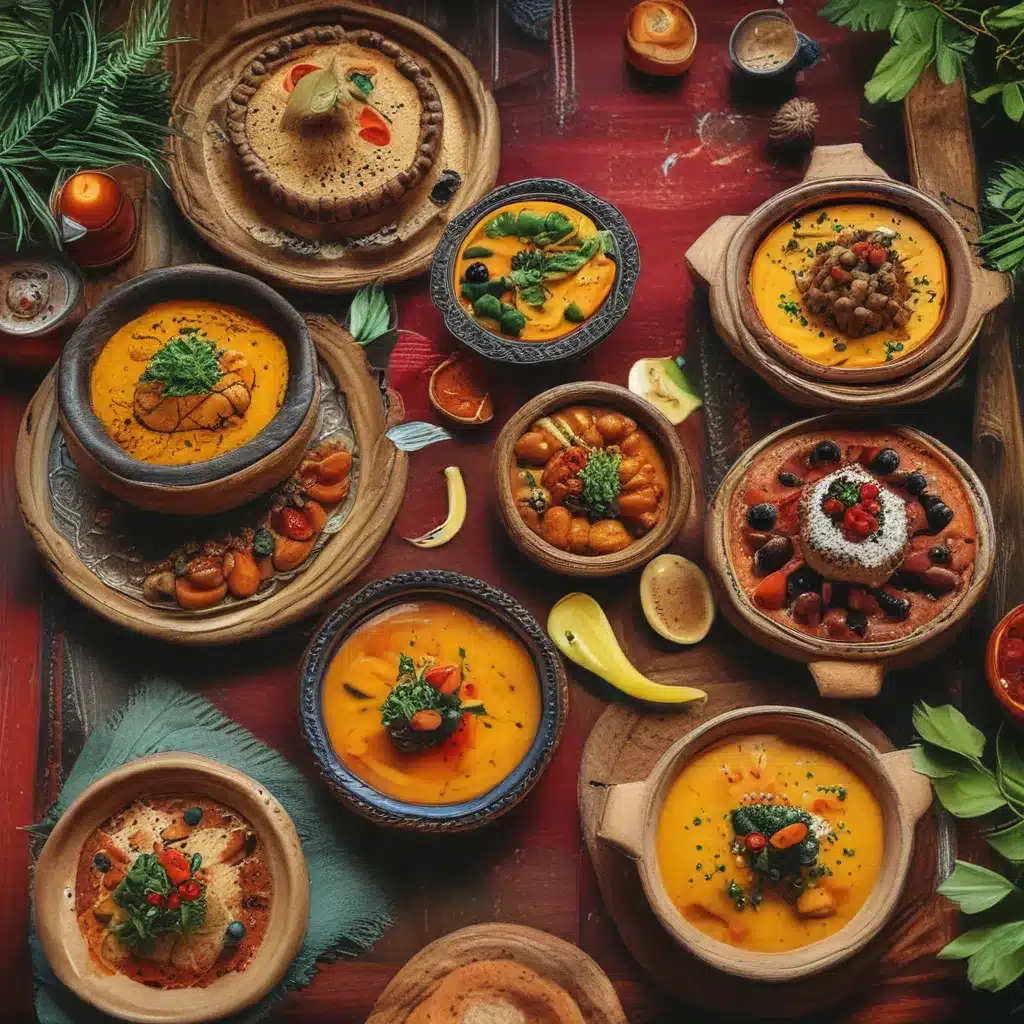
Uncovering the Hidden Gem of Moroccan Cuisine in the Heart of NYC
As I stepped through the ornately carved wooden doors of El Bahia, I felt like I had been transported to a different world – one where the bustling streets of Manhattan melted away, replaced by the warm, spice-scented air of a Moroccan riad. The moment I crossed the threshold, I knew I was in for an unforgettable culinary journey.
El Bahia, nestled in the vibrant neighborhood of Greenwich Village, is a hidden gem that has been delighting New Yorkers and visitors alike with its authentic Moroccan flavors. Owned and operated by the Khoury family, who hail from the ancient city of Fez, this restaurant is a labor of love, a place where the rich traditions of Moroccan cuisine are honored and celebrated.
El Bahia’s interior is a feast for the senses, with ornate tilework, intricate lanterns, and vibrant textiles that evoke the grand riads of Marrakech. As I settled into my cushioned seat, I couldn’t help but feel a sense of anticipation, knowing that the flavors that were about to unfold would transport me to the heart of North Africa.
Exploring the Diverse Flavors of Moroccan Cuisine
Moroccan cuisine is a true melting pot of influences, a harmonious blend of Berber, Arab, Mediterranean, and Moorish culinary traditions. It’s a cuisine that celebrates the use of fragrant spices, slow-cooked meats, and an abundance of fresh, locally sourced ingredients.
One of the first dishes that caught my eye on the menu was the tagine, a classic Moroccan slow-cooked stew named after the distinctive clay pot in which it’s prepared. I opted for the lamb tagine, a melt-in-your-mouth dish that had been simmered for hours in a aromatic sauce of saffron, cinnamon, and preserved lemon. The tender meat fell off the bone with the slightest prod of my fork, and the flavors were a symphony of sweet, savory, and tart.
Accompanying the tagine was a platter of fluffy couscous, another staple of Moroccan cuisine. Couscous is a small, pearl-like pasta that is traditionally steamed and served with a variety of stews, vegetables, and meats. At El Bahia, the couscous was light and airy, the perfect foil to the rich and complex flavors of the tagine.
But Moroccan cuisine is not just about tagines and couscous. The menu at El Bahia is a veritable treasure trove of dishes that showcase the diversity of this vibrant culinary tradition. I couldn’t resist trying the harira, a hearty soup made with lentils, chickpeas, and lamb. The broth was deeply flavored, with a subtle warmth from the blend of spices, and the tender chunks of meat added a satisfying heft to the dish.
Discovering the Art of Moroccan Hospitality
One of the things that struck me most about my experience at El Bahia was the warmth and hospitality of the staff. From the moment I walked through the door, I was greeted with a genuine smile and a friendly welcome. The servers were attentive and knowledgeable, offering recommendations and insights into the dishes that had me eager to try everything on the menu.
But the true highlight of my visit was the Moroccan tea ceremony that the staff performed tableside. As I sipped the fragrant, mint-infused tea, I was captivated by the graceful movements of the server as they poured the tea from a height, creating a beautiful, cascading stream. It was a ritual that epitomized the Moroccan values of hospitality, attention to detail, and the art of savoring the moment.
Sipping my tea, I couldn’t help but reflect on the rich history and cultural significance of this ancient practice. In Morocco, the tea ceremony is not just about drinking a beverage; it’s a deeply symbolic act that represents generosity, respect, and the importance of taking the time to connect with one another.
Embracing the Spirit of Moroccan Cuisine
As I left El Bahia, my senses still buzzing with the aromas and flavors I had experienced, I couldn’t help but feel a sense of gratitude. This restaurant had not only introduced me to the wonders of Moroccan cuisine, but it had also given me a glimpse into the rich cultural traditions that underpin it.
In a city as fast-paced and dynamic as New York, it’s easy to get caught up in the rush and forget to slow down and savor the moment. But at El Bahia, I was reminded of the importance of taking the time to truly experience and appreciate the art of Moroccan hospitality and the joy of sharing a meal with loved ones.
So if you’re looking to escape the hustle and bustle of Manhattan and immerse yourself in the captivating world of Moroccan cuisine, I urge you to head to El Bahia. Whether you’re a seasoned foodie or a curious newcomer, this hidden gem is sure to leave you with a newfound appreciation for the richness and complexity of Moroccan culinary traditions.


